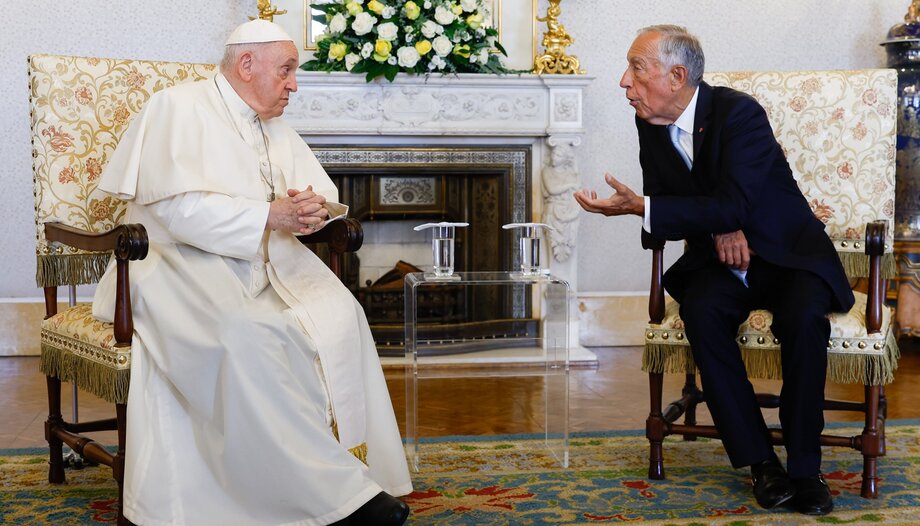After his arrival in Lisbon, the Pope traveled by car to the President's residence, the National Palace of Belém, where the welcoming ceremony and an exchange of gifts took place.
At around 12:15 p.m. (Lisbon local time), the Pontiff was received by the political authorities, civil society and the diplomatic corps at the Belém Cultural Center in Lisbon.
The Pope is "happy to be in Lisbon".
In his address to the authorities, the Pope said he was "happy to be in Lisbon, a city of encounters that embraces different peoples and cultures, and which in these days is becoming even more universal; it is becoming, in a way, the capital of the world. This fits well with its multi-ethnic and multicultural character - I am thinking of the Mouraria district, where people from more than sixty countries live in harmony - and reveals the cosmopolitan trait of Portugal, which has its roots in the desire to open itself to the world and explore it, sailing towards new and wider horizons".
He also pointed out that the sea in Lisbon "is much more than a landscape element, it is a vocation imprinted in the soul of every Portuguese (...). Faced with the ocean, the Portuguese reflect on the immense spaces of the soul and the meaning of life in the world. And I too, being carried away by the image of the ocean, would like to share some thoughts".
The Pope then reflected on the fact that the ocean unites peoples, countries, lands and continents and that "Lisbon, city of the ocean, reminds us of the importance of the whole, the value of borders as areas of contact, not as barriers that separate". Francis pointed out that today the problems of humanity are global, and only together can we face them.
WYD: "an impulse of universal openness".
Recalling that the Treaty on the reform of the European Union was signed in Lisbon in 2007, the Pope said that he hoped that "the World Youth Day be, for the 'old continent', an impulse of universal openness. Because the world needs Europe, the real Europe; it needs its role as a builder of bridges and peace in its eastern part, in the Mediterranean, in Africa and in the Middle East.
In this way, Europe will be able to contribute, within the international scenario, its specific originality, outlined in the last century when, from the crucible of world conflicts, it lit the spark of reconciliation, making possible the dream of building tomorrow with yesterday's enemy, of opening paths of dialogue and inclusion, developing a diplomacy of peace that extinguishes conflicts and eases tensions, capable of capturing the faintest signs of détente and of reading between the most twisted lines".
In this regard, the Pope reflected on Europe's drift and the path the West is following: "I think of so many unborn children and elderly people abandoned to their fate; of the difficulty of welcoming, protecting, promoting and integrating those who come from far away and knock on our doors; of the loneliness of many families struggling to bring into the world and raise their children.
"Sharing the hope of the Gospel".
He pointed out that Lisbon, which is hosting these days "an ocean of young people," gives us reason for hope. "They are not in the streets to cry out in anger, but to share the hope of the Gospel. And if from many sectors today there is a climate of protest and dissatisfaction, fertile ground for populism and conspiracy theories, the World Youth Day is an opportunity to build together.
In conclusion, the Pope pointed out three "laboratories of hope" on which to work: the environment, the future and fraternity. Regarding the latter, Francis pointed out that Christians "learn it from Our Lord Jesus Christ (...) I have learned that there are many young people here who cultivate the desire to become neighbors; I am thinking of the Missão País initiative, which brings thousands of boys and girls to live in the spirit of the Gospel experiences of missionary solidarity in peripheral areas, especially in villages in the interior of the country, where they visit many elderly people who are alone. I would like to thank and encourage, together with the many people in Portuguese society who care for others, the local Church, which does so much good, without taking center stage".
After lunch, the Pope will meet with the President of the Assembly of the Republic, Augusto Ernesto dos Santos Silva, and with the Prime Minister, António Costa.
The last act today for the Pope will be the recitation of vespers accompanied by the local clergy at the Royal Monastery of Santa Maria di Belém.








